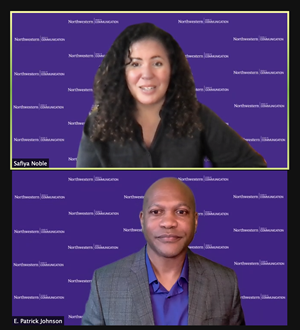
Despite our near-dependance on technology to communicate, work, socialize, and consume, we don’t fully understand our digital traces. And given Big Tech’s global dominance and notorious reticence, its exploitation of these gaps poses a serious threat.
Offering both a warning and a call to action, technology bias scholar Safiya Noble shared this and more about her research and advocacy during her 90-minute April 22 “Dialogue with the Dean” event, hosted via Zoom by Dean Johnson.
“Sometimes the most banal kinds of things are the things we should be paying attention to,” Noble said of internet searches. Author of Algorithms of Oppression: How Search Engines Reinforce Racism, Noble is an associate professor in the Department of Information Studies and the codirector of the Center for Critical Internet Inquiry at the University of California, Los Angeles.
Google in particular has been in Noble’s sights for its ubiquity and its tendency to omit communities of color from its code—or to present them in a way that’s inaccurate or offensive. From search-produced oversexualization and fetishization of Black and Asian women to the greater prevalence of criminal-background-check ads for users with “Black-sounding” names, bias and discrimination pose a problem that can no longer be willfully ignored.
“We should be listening to the people whose voices are in the margins; they tell us a lot about the world we live in,” she said. “And we should not wait until there are mountains of harm before we decide to do something about what’s happening.”
Johnson’s February guest, Ruha Benjamin, kicked off their discussion by talking about the importance of images. Now a professor of African American studies at Princeton University, she decided at age 11 that her future was in the academy, largely because of a passing appearance by the character Dean Hughes—head of the fictitious Hillman College, a historically Black institution, on the sitcom A Different World.
She went on to learn the importance of access to—and autonomy from—technology. At age 15, Benjamin and her family moved from South Carolina to the Marshall Islands in the South Pacific. There she noticed stark differences between one island’s incongruously suburban conveniences, thanks to its US military presence, and a nearby island’s displaced indigenous population living with the fallout of sustained nuclear bomb testing.
These early experiences shaped Benjamin’s approach to scholarship, a journey she detailed during her 90-minute talk with Johnson. Author of Race After Technology: Abolitionist Tools for the New Jim Code, she examines the social dimensions of science, technology, and medicine—in particular, who pays the price of tech’s big promise.
“It’s not simply the technology that is creating the problem. It’s what’s imbued in the technology,” Benjamin said. “It’s the values and the norms and the hierarchies that are encoded in it. One example is in a lot of the forms we have to fill out online. They’ll give you a certain amount of space to give a certain number of characters for your name. Some people come from a family or a culture that has a lot of characters.
“For example, my middle name is my mother’s maiden name. And there are a lot of cultures where your name isn’t just you, personally, but it’s also your lineage. So if you have too many names, or your name is too long, then whoever designed the little form is normalizing certain kinds of naming rituals. It’s creating a context where some names are legible—literally—and some names are not. So, that tells us if something like a simple-looking form that we don’t consider a cultural object has all of those decisions and values, then what about more complex technologies? How are they mediating whether it’s about race or gender or disability?”
The first “Dialogue with the Dean” last fall featured John L. Jackson, dean of the University of Pennsylvania’s Annenberg School for Communication and codirector of Johnson’s documentary Making Sweet Tea.
